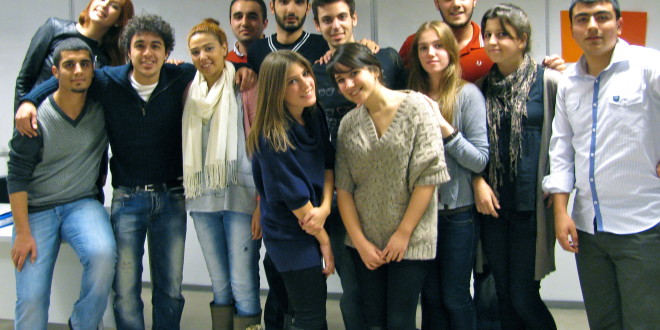I am grading essays this week, a tedious job. I mark the same errors over and over. Subject-verb agreement. Singular-plural error. Because my students all speak the same first language, their English mistakes are predictable. And, oddly, they are often brought to me by technology.
Most of my students have electronic dictionaries, which they fervently believe will help them become better writers. They look up words to impress me, even though I encourage them to write simply. In one essay, the writer apparently felt that the phrase, “take a walk” was too mundane. With a little online effort he came up with, “The people can go to the park and be ambulatory.”
The other day I had a young woman writing about the benefits of tourism. See if you can find the twenty-five-cent word: “Tourist who come foreign country have foreign exchange to leave. For this economy of country develops. In addition foreign trade develop. For instance, a tourist who come in our country can like anything such as endemic cheese, cream, vegetables. . .”
I like my kids. I felt sad when finished with my first group in late March; we had spent 160 hours together, after all. I wondered if I would like a new group as well. The first day of the spring term, I faced the usual unusual names (Efe, Ece, Gulsah, Muhsin, two Yunuses, Suleyman and Cem, pronounced gem). How could this new batch ever become familiar or dear? But now after Week Three, I am really enjoying them.
Yesterday, Yunus and Suleyman came up to me at a break and said they wanted to celebrate the birthday of classmate and buddy, Fatih, during our last period. I agreed. They headed downstairs to the coffee shop to buy a treat and returned grinning. At about 4:15 they pulled out a huge, American-looking chocolate cookie and placed a cigarette lighter (many, perhaps most of the students smoke) on top of it. They struck the light and Fatih beamed as he blew it out while the class chorused (surprisingly, in English) Happy Birthday.
I am still trying to get used to the amount of talking that occurs in class. Students in our program don’t seem to think it is rude to carry on conversations when the teacher is speaking. And I don’t mean whispering. Remember when you were in school and the teacher would catch you “talking out of turn?” You would stop in the middle of your sentence, right? In the middle of the word, even. Not these kids. They finish the paragraph even as I stand staring at them.
This phenomenon surprises me and I’m trying to understand it. I’ve long been under the impression (true in the other countries in which I’ve lived) that American students are overly casual and that the rest of the world’s students show their teachers a lot more respect. Not here. I know part of the noisiness in my classroom is students checking with each other to make sure they understand what I’m saying. Another part of it occurs because they are extremely social and group-oriented, and want to work together on every task. But that doesn’t explain all of it.
All of us “team teach,” which means I take another teacher, Nurgul’s class two mornings every week and she takes mine. Nurgul has three male students who constantly converse in voices even louder than the Turkish norm. Last week I lost my temper. “Why don’t you just leave?” I asked the offenders. “If you’re not going to listen, you can go!” But they just sat there. Perhaps they didn’t understand my rapid English. Or maybe they were hoping to see an American teacher meltdown.
The rub is that trying to impose my will in a Turkish classroom goes completely against the rules I’ve set for myself here. I believe in being a pleasant, agreeable visitor. I think it’s rarely appropriate to voice a negative opinion while in a foreign country. I always defer to Turkish ideas. Heck, I even step off the sidewalks to let Turks pass by. Now I feel torn between trying to work effectively and trying to be the ideal expatriate.
Deeper understanding is easier when I’m not standing in a noisy classroom. My students have very little freedom. After taking a national high school graduation test, they are herded into colleges based on their scores. Those without sufficient English spend an intensive twelve to fifteen months preparing for their all-English curriculums. After college there is a push to find jobs; although currently booming, Turkey is just now coming into prosperity and has long had high unemployment rates.
Although my students will tell you which branch of engineering or business they plan to study, in truth they are as clueless as 18-year olds anywhere. Many sit in class simply to please their parents. When I think of the outdoor adventures and overseas travel—and even the crazy summer jobs—American kids their age have, I feel compassion for these very scheduled, very constrained kids.




I am pretty impressed with the level of understanding you have achieved of the situation here and where your students stand. It is hard for them, yes, but it is also v hard for you the teacher to accept what seems to be casual disregard. I know I found it v difficult. They perceive foreign teachers as ‘friendly’ but can’t equate that with ‘respect’ as we know it.
Hey! The ban seems to be off!!!